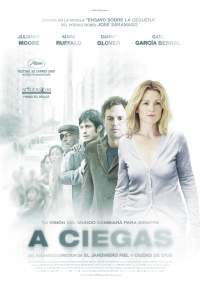






The writer Jose Saramago appears to be quite satisfied with the film adaptation of his novel, brought to us by the Brazilian filmmaker Fernando Meirelles, responsible for hits like City of God and The Constant Gardener. Blindness will be showing at cinemas from 13th February.

|
"Acting blindly means without knowing what you really want to do and thats not what happens in this story, in which all the characters really are blind. The Spanish title, Blindly, is one of the few things Jose Saramango doesnt like about the film adaptation of his novel, the original Portuguese title of which could be translated as Essay on blindness. The film version opened the last Cannes Film Festival.
Blindness is an apocalyptic fable about an epidemic of blindness which attacks first one man, then a city and then the entire planet. However, if what the sightless normally see is darkness, those affected by the white illness suffer an excess of brightness, and can only see white; an interesting allegory for exploring the good and evil of human nature in an extreme situation.
Leading the cast are the Oscar nominee Julianne Moore, Mark Ruffalo, Danny Glover, Gael Garcia Bernal, Alice Braga, and the Japanese Yusuke Iseya and Yoshino Kimura. A melting-pot of different nationalities in a Brazilian, Japanese and Canadian production, which according to Meirelles himself had to reflect a family of humanity.
However, despite his dissatisfaction with the title, Jose Saramago assures us that the film is an almost perfect adaptation, as actually nothing in the novel is completely perfect, and claims only a few details are missing from the original text. The fact is the author was reluctant to allow his text to be adapted for the cinema, until one day the producer and scriptwriter of the film went to visit him at his Lanzarote home and finally convinced him. I dont normally approve of film adaptations of literary works, for example War and Peace, but I have my likes and dislikes. I liked their faces and I said yes.
Meirelles has been working on this story since 1997 and once he managed to gain Saramagos consent, the latter gave him total freedom to do what he liked to the novel, as long as they didnt consult him; freedom which the director often failed to take advantage of as, even with the script in my hand, we had to go back to the novel again and again to see what it really wanted to convey.
Deliberately set in an anonymous city, but shot in Sao Paulo, Montevideo and the old Guelph prison in Canada, the film shows us an unpleasant reflection of the society in which we live, where we can see things, but we are blind because we dont know what they are. Saramago, on the other hand, sees very clearly. Everyday reality tells us it is impossible to be optimistic and Im not, but it is the pessimists who can change the world.

If you would like to receive our weekly newsletter and be kept up-to-date with new additions to our catalogue and film news, please provide your e-mail address in the following field:
By accepting the Terms "Conditions" the sending of my personal data, I authorise its handling by FILMOTECH for the sending of information.